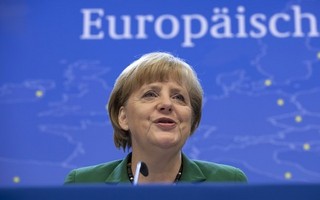BACK IN November 2011, as Europe struggled with its ongoing financial crisis, Polish foreign minister, Radek Sikorski, gave a speech in Berlin that beckoned toward his country’s western neighbor and pleaded with it to save the euro. “You know full well that nobody else can do it,” said Sikorski. “I will probably be the first Polish foreign minister in history to say so, but here it is: I fear German power less than I am beginning to fear German inactivity. You have become Europe’s indispensable nation.”
Indispensable? This was an extraordinary statement from a top official of a nation that was ravaged by Germany during World War II. And it reflects a profound shift taking place throughout Germany and Europe about Berlin’s position at the center of the Continent. The past view that what was good for Germany was bad for the European Union is being supplanted by a new attitude that what is good for Germany is even better for its neighbors.
And Germans, who since 1945 had accepted the subservient European role forced upon them by their victorious World War II adversaries, are now cinching up their collective lederhosen and adopting a more assertive posture. The country is shedding its status as junior partner to America and embarking upon its own path. All this is evident in five important ways:
• Germany is forging a new national identity that is less influenced by the Nazi past and that looks to the broader sweep of the country’s place in European history dating back to the eighteenth and nineteenth centuries. Germany is increasingly looking back at its Prussian ideals, which it sees as having been betrayed, not represented, by Nazism.
Read Full Article »




